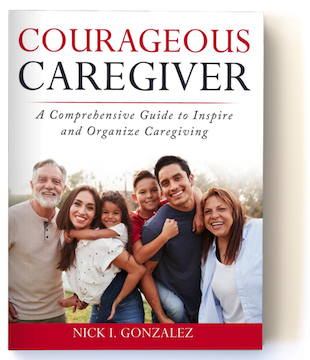
Have you ever questioned the effectiveness of prayer when faced with a seemingly unchanging situation?
Recently, there's been a persistent prompting in my heart to share about praying for a sick spouse, especially when the situation feels utterly hopeless.
This journey I know intimately, as my wife, Marisol, has been living with Alzheimer's disease since 2017. It's been an excruciating journey, to say the least. My prayers for her have been all over the place during this time.
On Earth, Alzheimer's is an incurable disease. While modern medicine currently has no known cure, it's considered a progressive and irreversible condition. Sometimes, I wonder why, of all the diseases in the world, I have to confront this one.
Thankfully, organizations like the Alzheimer's Association (which I support) are actively engaged in researching solutions to prevent this painful disease. Their support groups are a vital resource, one from which I personally benefit.
Alzheimer's is a disease in which you watch your loved one slowly lose more and more ability to remember, to recognize, to communicate, and ultimately, to live independently. As you witness your loved one's personality fade and their connection to the world around them diminish, it's heartbreaking.
It's especially painful to see that with her severe dementia, my wife has lost the ability to speak clearly, feed herself, and is unable to hold our very own grandchildren or recognize who they are. We have three grandchildren now and will have two more by the end of this year.
So, why do I pray in an allegedly hopeless situation?
Let me cut to the chase. Here's what anchors my hope and compels me to pray for Marisol, even amidst the challenges of Alzheimer's:
I remember the goodness of God. In the midst of this struggle, I've decided to remember his love, care, and what the Lord has done for me. It's still true: "God is good, all the time." A few of our friends have shared with me that they do not understand why Marisol has Alzheimer's. They say she is such a nice person, friend, mother, and spouse. I, too, agree with them, but the "why" of suffering is often a mystery beyond our understanding. Remembering God's love comforts me in this pain, which causes me to stand on the truth of scripture, and not on my own feelings.
Scripture affirms this truth, as seen in Psalm 100:5, "For the LORD is good and his love endures forever; his faithfulness continues through all generations," and Nahum 1:7, "The LORD is good, a refuge in times of trouble. He cares for those who trust in him."
No matter what your loved one is facing, remembering God's inherent goodness can be a source of strength for your prayers, too.
I trust in God's sovereignty. In other words, I don't have to understand or know the reasons why my wife is sick with an incurable disease; I trust that God is in control, a truth powerfully stated in Psalm 28:7: "The LORD is my strength and my shield; my heart trusts in him, and he helps me. My heart leaps for joy, and with my song I praise him." As I trust in God, I meet with doctors, seek medical advice, attend my support group, give to Alzheimer's organizations (in the hope that one day they find a solution), and care for Marisol with the same love and dedication she has always given me.
Even when the 'why' of your loved one's illness or situation remains a mystery, trusting that God is ultimately in control will provide a strong foundation for your prayers. See also Acts 17:28, Proverbs 3:5-6, 46:1, 56:3, 118:8-9, Isaiah 26:3-4, and Philippians 4:6-7.
I pray. Because I remember God's goodness and trust in His sovereignty, I pray with confidence. Knowing He is in control and that Marisol and I are held in the palm of His hands (Isaiah 49:16) allows me to approach the Lord boldly, just as we are encouraged in, Hebrews 4:16: "Let us then approach God’s throne of grace with confidence, so that we may receive mercy and find grace to help us in our time of need."
My wife has always been a strong person of prayer, and I have learned so much from her devotion to prayer. As her husband, I continue to carry that mantle, lifting her up as she has lifted so many others. Scriptures like James 5:14-15 and 2 Corinthians 12:7-10 remind me of the power of prayer, trusting God for His grace and strength. As a result, when I pray, I thank Him for his presence and pray for God's protection, power, provision, patience, perspective, and plan.
Just as remembering God's nature, a theological anchor for me, empowers my prayers, holding onto those truths (his goodness and sovereignty) can also embolden your prayers for your loved one.
Beyond Words.
While everything discussed up to this point is important and biblically accurate, sometimes the heart becomes so overwhelmed that you can't pray, and you're speechless. It's in these very moments, when prayer feels impossible, that I've recently come to understand another profound aspect of prayer: groaning.
This type of prayer, this deep cry, is when you are in an extreme time of need, worry, or emotional distress. It’s when you're weak, vulnerable, and your heart is heavy with concern or fear, and you try to talk to God. It's when you attempt to say a prayer, but there are no words. All that comes out is a groan of despair.
When I am alone, praying for my wife, my prayers often become groans. We see this mentioned in scripture as well. Paul, in Romans 8:26, talks about groaning in prayer. He writes, "In the same way, the Spirit helps us in our weakness. We do not know what we ought to pray for, but the Spirit himself intercedes for us through wordless groans."
I remember the first time I groaned in prayer years ago when my mother was in the hospital, and her situation didn't look good. My sister and I were in the room with her, and we attempted to pray. All that came out were groans and tears. God answered our prayer, as my mom is 96 years strong today.
King David also groaned in prayer. "Give ear to my words, O Lord; consider my groaning. Give attention to the sound of my cry, my King and my God, for to you do I pray." Psalm 5:1-2. Many people in the Bible groaned in prayer. David again in Psalm 22:1, Jeremiah in Lamentations 1:21, and Job in Job 3:24.
Sometimes, prayers are not just about the words we speak. They're also about the deep, unspoken emotions expressed through our moans, sighs, whimpers, and cries.
Groaning in prayer should be a source of comfort for believers. Thankfully, God provides an outlet to pour out our feelings when we are completely burdened. We can know that the Holy Spirit is working in us with prayers that can only be heard and understood by God.
Facing Despair: Even a Groan is a Prayer.
If you are in a tough place in your life, perhaps battling anxiety and depression, and prayer is a struggle, give God your overwhelm. He still is one prayer or groan away. Find a quiet place, breathe, and release your burdens to the Lord. Trust me, it's the most freeing thing you can do. As Psalm 61:2 beautifully says, "When my heart is overwhelmed, lead me to the Rock that is higher than I."
I don't usually repeat the same prayer for my wife all the time, but recently, I've been praying the following prayer almost word for word at night while hugging her. I keep the prayer short so that she can follow along and not feel uncomfortable. It goes like this:
Heavenly Father, thank you for my beautiful wife, Marisol. Thank you that I am her husband. Thank you for being in control of our lives, and that we are in the palm of your hand. Thank you that Marisol is truly a champion and a winner. I pray that you give her a good night's rest and thank you for the angels surrounding us every day and night. Heal her body from head to toe, and let her wake up happy, healthy, and healed. In the matchless name of Jesus Christ, we pray, Amen.
Remember earlier, I wrote, "How do you pray in a hopeless situation?" I also said, allegedly. Why? Because the truth is, there is always hope—hope in God. Don't give up on praying for your loved one or yourself when things don't look good. Remember God's goodness, trust in Him, and keep praying. As Max Lucado wisely said, “When we work, we work; but when we pray, God works.”
Prayer is how I defy despair. And that's why I still pray for my wife with Alzheimer's.
I welcome your comments below. If this message resonated with you, sign up for updates and share it with a friend.
You might also be interested in my book Courageous Caregiver: A Comprehensive Guide to Inspire and Organize Caregiving, which aims to empower caregivers to navigate their caregiving journey.
See also: "In Sickness and in Health" blog post.
Nick Gonzalez
Author | NickGonzalez.com
Empowering Couples to Build Thriving, Faith-Filled Relationships
















“Ye are of God, little children, and have overcome them: because greater is he that is in you, than he that is in the world.”
God is pleased through his son Jesus and he who is in us is more powerful than anything in the world . Have faith ! Everything will be okay 🤍